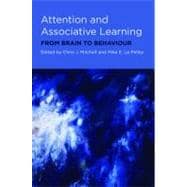
Note: Supplemental materials are not guaranteed with Rental or Used book purchases.
Purchase Benefits
What is included with this book?
| Contributors | p. ix |
| An introduction to attention and learning | p. 1 |
| Two theories of attention: a review and a possible integration | p. 11 |
| Attentional learning | p. 41 |
| Selective attention to conditioned stimuli in human discrimination learning: untangling the effects of outcome prediction, valence, arousal, and uncertainty | p. 71 |
| Latent inhibition | p. 99 |
| Attention and perceptual learning | p. 131 |
| Acquired distinctiveness and equivalence: a synthesis | p. 159 |
| Attention and human associative learning | p. 187 |
| On the use of the term 'attention' | p. 217 |
| Attention and memory in human learning | p. 245 |
| Backward blocking of relevance-indicating cues: evidence for locally Bayesian learning | p. 273 |
| Brain systems of attention in associative learning | p. 305 |
| Neural correlates of attentional set | p. 351 |
| Clinical Studies of attention and learning | p. 385 |
| Index | p. 407 |
| Table of Contents provided by Ingram. All Rights Reserved. |
The New copy of this book will include any supplemental materials advertised. Please check the title of the book to determine if it should include any access cards, study guides, lab manuals, CDs, etc.
The Used, Rental and eBook copies of this book are not guaranteed to include any supplemental materials. Typically, only the book itself is included. This is true even if the title states it includes any access cards, study guides, lab manuals, CDs, etc.